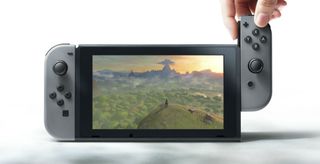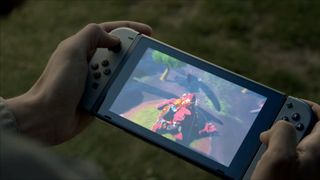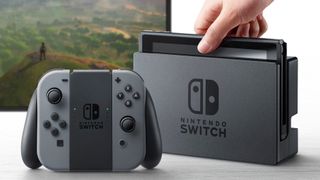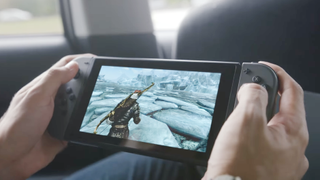Portable or not, Nintendo’s Switch is the same old stay-at-home console

Have you ever held a PS Vita in your hands? Here was a well designed, sexy piece of hardware that offered something that seemed too good to be true: PS3 quality triple-A games on the go. I’ve rarely taken hold of a piece of hardware that felt more at home in my mitts than a Vita, in truth. It screamed class, it screamed invention, it screamed Sony at its best.
Jump forward six years and, not even Sony’s slick PR department can cast a halo around PS Vita. The handheld fell way short of sales expectations early on and never recovered, spending its years being roundly trounced by Nintendo’s DS and 3DS assault. It turned out that, however well packaged the hardware, the ability to play big-budget console sized games on a portable just didn’t have much pull. PlayStation aficionados aside, Vita had been designed to solve a problem very few gamers actually had.

With the recently unveiled Nintendo Switch, history seems to be repeating. Switch is an undeniably well designed, flexible piece of hardware that enables you to take console games out on the road with you; from playing them on the plane or at a party, right through to (quite bizarrely) taking on your mates at Mario Kart in the back of the van.
Switch’s simple click on, click off approach appears to offer a level of simplicity that’ll make taking Zelda with you while walking the dog almost second nature. It screams class, it screams invention, it screams...well, you know where I’m going with this. Switch does have one big problem, however. Beyond the friends I have for whom picking up any fresh Nintendo hardware is mandatory, I can’t actually think of anyone who would want one.

Chances are anyone reading Gamesradar right now will be exactly the kind of person Switch is designed to target. However, that’s no measure of success. A large portion of folks who visit this site will have also forked out for a Wii U - a console that, as it stands, has barely sold more units than the console Sega’s celebrated but ultimately ill-fated Dreamcast.
If Switch is to be the kind of success Nintendo needs, it has to reach the gamers (and, indeed, non-gamers) it drew in like a magnet with the original Wii. To do that, Switch needs to offer something that not only appeals to you, but to your Mum, your Dad and your Gran as well. If anyone can tell me hand on heart that Switch ticks all those boxes, then I’ll concede.

As things stand, however, Nintendo is caught up within its own hype. It’s created an admittedly inventive console that focuses on showcasing the company’s ingenuity and technical prowess over and above meeting the needs of any gamers beyond its core base. This is worrying. As Nintendo itself found out decades ago with Virtual Boy, just because something is technically possible doesn’t mean it’s commercially viable.
Sign up to the GamesRadar+ Newsletter
Weekly digests, tales from the communities you love, and more
It’ll be easy come launch to think strong early sales means Switch has cracked it: however good or bad the system, Nintendo can always count on a good 10-20 million people trudging down to the shops and handing over their money. Getting beyond that figure is the real challenge, and something Wii was able to achieve by breaking down barriers: Nintendo’s Wii-mote enabled people who had never played games before to not only try them, but love them. It was about as close to a revolution as we’re ever likely to see in the world of games.

Nintendo’s problem ever since, however, has been finding a way to take that new blood to the next step. Despite sharing the Wii brand, Wii U actually had very little in common with Nintendo’s barnstorming console and, similarly, Switch makes no attempt to take on Wii’s legacy either. There’s no ‘Wii-mote’ moment here: while the ability to take console games outside of the house is impressive on a technical level, it’s not a barrier that has kept millions away from gaming for decades.
Even more fundamentally, I think even Nintendo’s core base will eventually come to realise that big, expansive console games aren’t the ideal bedfellow for portable play. This is something the mobile games industry has spent the last decade coming to terms with. Commentators believed the launch of iPad back in 2010 would herald an era of console-sized games on a powerful piece of portable hardware. As developers discovered, however, the nature of playing games on the go means that mobile games have to deliver a meaningful experience every 30 seconds or so, because sometimes 30 seconds is all the people playing them have.

That doesn’t mean the game itself can’t be a big, expansive prospect, but it does mean developers have to get a bit more creative with how they deliver it. If Nintendo fans are saying now that they can’t wait to play Zelda on the bus, trying catching up with them in six months time when they’ve missed their stop several times over because they were so engrossed with play. There’s an art to making games that fit playing on the go, and there’s every evidence Nintendo knows how to do it, but more than likely at the expense of games designed to be played at home. One or other will lose out, that’s a certainty.
That’s the crux of the issue with Nintendo’s Switch. Every time someone has utilised the technology available at the time to offer the ‘golden ticket’ of console games you can play on the go, consumers have rejected it.
Now, if anyone has a chance of breaking that pattern, it’s Nintendo, but until someone can highlight the leagues of everyday consumers who vowed never to buy another console until they could play it while isolating themselves from friends and family at a roof party, the idea that Switch is the next chapter in Nintendo’s success story is ultimately a hollow one. Just what Nintendo does if and when Switch fails to make its mark is the real debating point. Could a successful launch of Super Mario Run be a sign of better things to come? As commentators having been suggesting for decades, going multiplatform could yet be the real ‘switch’ Nintendo needs.
Most Popular





